Meryl Streep's star turn
Updated: 2011-11-21 09:50
By Raymond Zhou (China Daily)
|
|||||||||
 |
|
Meryl Streep appears at the National Center for the Performing Arts with Chinese actors Liu Ye (left) and Ge You. Zou Hong / China Daily |
 |
The American actress took part in a panel discussion on film and performing, part of the US-China Forum on the Arts and Culture. Raymond Zhou reports.
When the doyenne of great acting walked into the multifunction theater at the National Center for the Performing Arts on Friday afternoon there was a palpable gasp of excitement. But as Meryl Streep shared her experiences and thoughts on her art, there was a lot of hearty laughter from the audience, especially when her communication with Chinese actors Ge You and Liu Ye encountered some linguistic obstacles and they had to rely on non-verbal hints. Streep admitted that, although she is drawn to a film by a good script, the most amazing part often turns out to be those moments without dialogue. She cited Out of Africa, in which the flying sequence does not have lines for the characters, but proved to be the most touching part of the whole film.
"Acting uses a universal language," says the 16-time nominee of the Academy Awards. "It is a form of deep communication, where the connection is immediate."
With typical humility, Streep says she has never "developed a method that I can count on to play the next role", which she says she always considers the "most difficult" in her vast repository of memorable roles. She would ask her husband, "Why do they want me for the part?"
But she recognizes this kind of insecurity as "part of an actor's arsenal", to prevent repeating oneself. It is also "the secret of film acting". Streep compares each film project to a marriage: Each director has a different approach and she will adapt to his or her method.
"Actors give up and surrender," she says. She does make suggestions to the director, but she never "looks from above", which she says should be the perspective of the director. Instead, she would "offer a range of choices" for her interpretation of the role and let the director make the final decision.
Despite her enormous talent, Streep is known to be a very giving and kind person to work with. She praised Liu Ye for effectively expressing "tenderness and terror" in the film Dark Matter, in which Liu plays a Chinese student whose failure to adapt to the US environment turns murderous, while Streep is his well-meaning mentor.
Liu recounted details of the production, saying Streep would improvise to bring out freshness in his acting, but once she realized he had linguistic difficulties she would stick to the script. During a big scene when he struggled with lines of astrophysical jargon, Streep encouraged him all the way.
"Merci," Liu thanked her in French, the language of his wife. On a previous occasion, he had shared similar details with this reporter and expressed his gratitude for working with the master of film acting.
For Friday's panel on film and performing, part of a four-day program for the US-China Forum on the Arts and Culture, the actors also shared their feelings about theatrical performances. Streep, rigorously trained at Yale in repertory theater, gained versatility through a great number of classical roles. She called hers "the last of the classical education in drama".
She started in theater and goes back occasionally. "Playing on stage is good because you can change for each night." This is unlike film acting, where the actor has to cede control to the director.
Liu concurs.
"When I changed a line, all the director would do was stomp his feet and clench his teeth in the wings," he says, referring to three years ago when he took on a stage role for 10 nights.
Theater gives him a different feeling, he says, because the audience can "breathe with you and see you sweat".
For a somewhat related reason, he dropped his plan to have eye surgery to correct his vision. There was this time he caught a crewmember snoring on a film set while he was immersed in a role, and he got very upset. Since he rarely wears glasses, he would not normally notice such things in his peripheral vision and would not be distracted.
But when Liu Ye talks about strict eight-hour working days in the US, Streep corrects him. "I've never worked under 11 hours a day in my life," she says. But "I like to work. I'm consumed by it," she adds, comparing film acting to a series of monogamous relationships when the actor is "true to this thing for four-five months and then moves on." That's why "it's never boring".
Like marriages, she says, she can forget the roles she does not want to remember and remember just the good ones.
Acting allows her to live out other people's lives vicariously. "I put my own difficulties, joys and complications into my work, and nobody notices them," she says.
When acting, "you can be anything you want, even work out your murderous instincts, or instincts to be a fool, a king or a leader". And it is the same for the audience, which flocks to movies for "catharsis" and unleashing emotions that may not otherwise be expressed.
For her new role in The Iron Lady, she read up on background materials and made a point to cover both Margaret Thatcher's supporters and detractors.
"History is written by people with opinions," she says, "and you'll have to leave judgment to the analyst who watches the movie."











